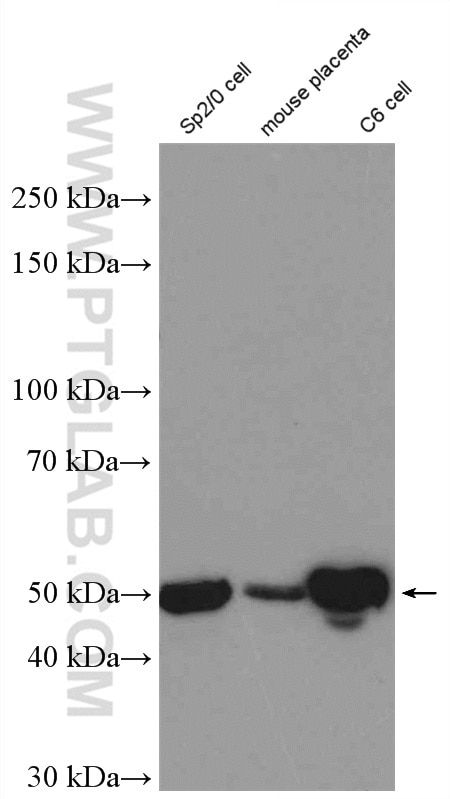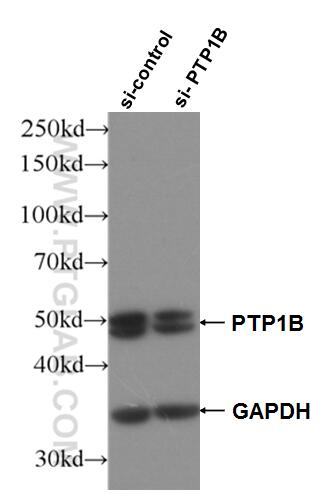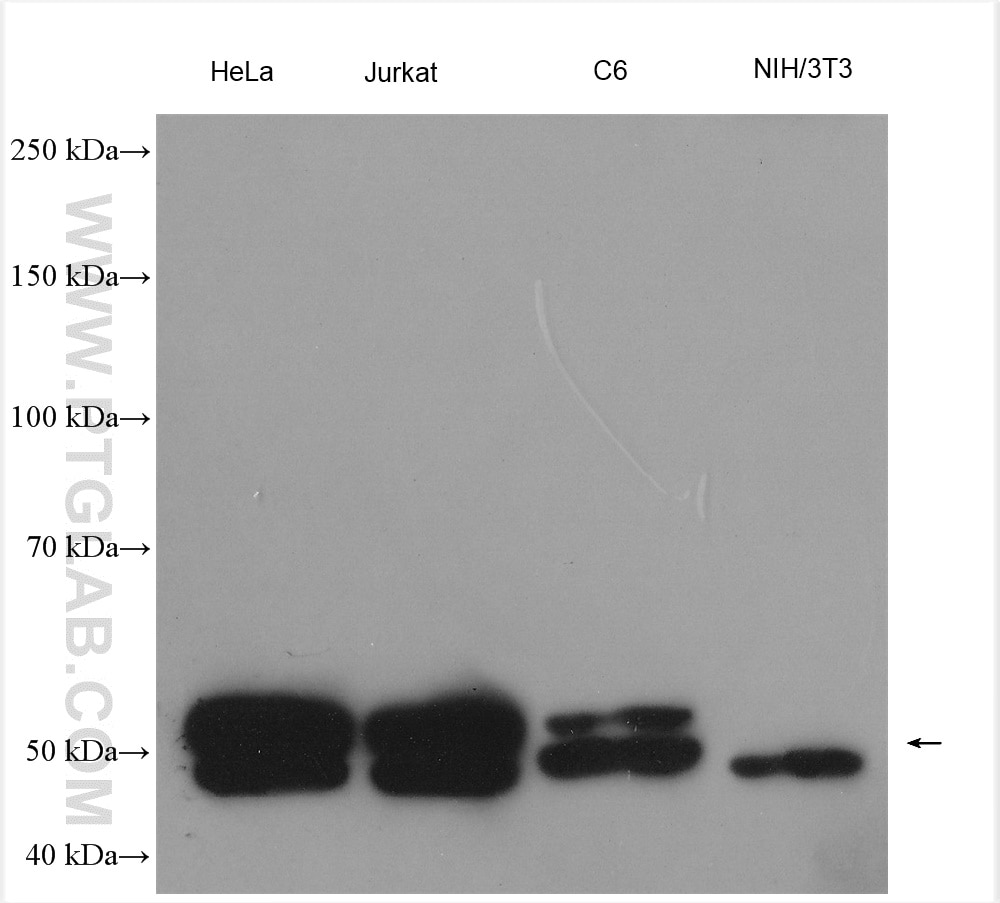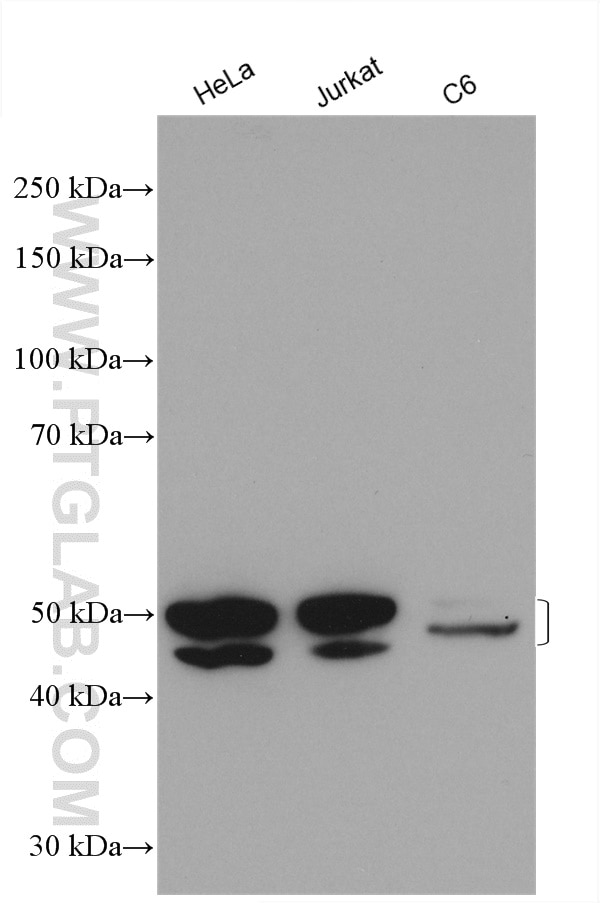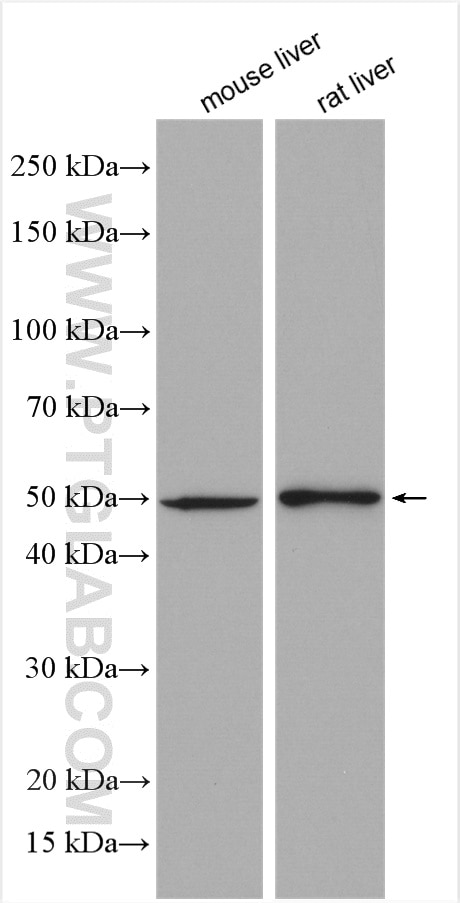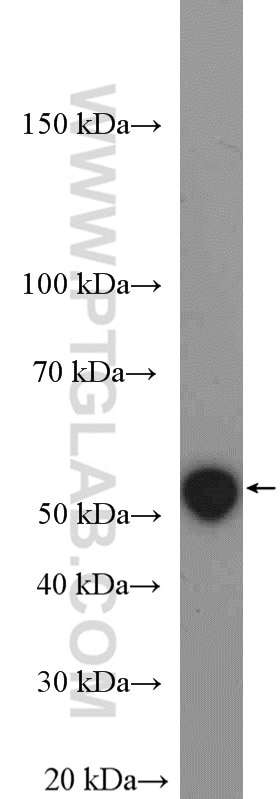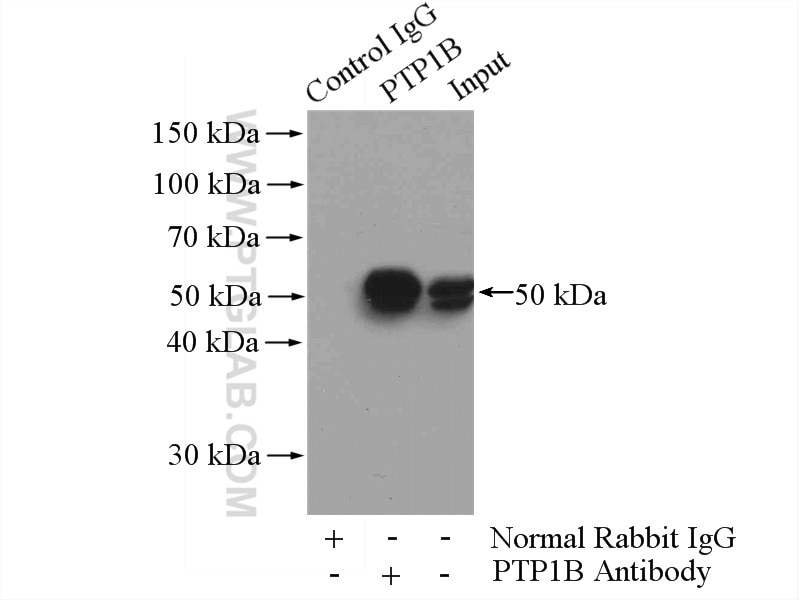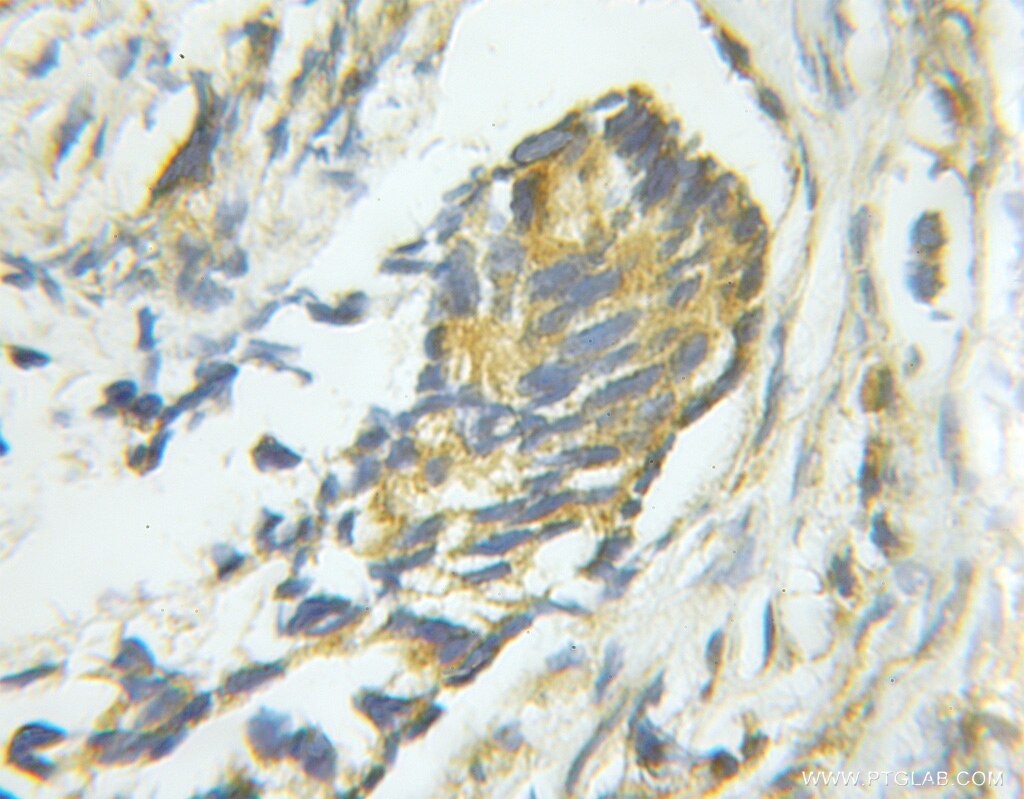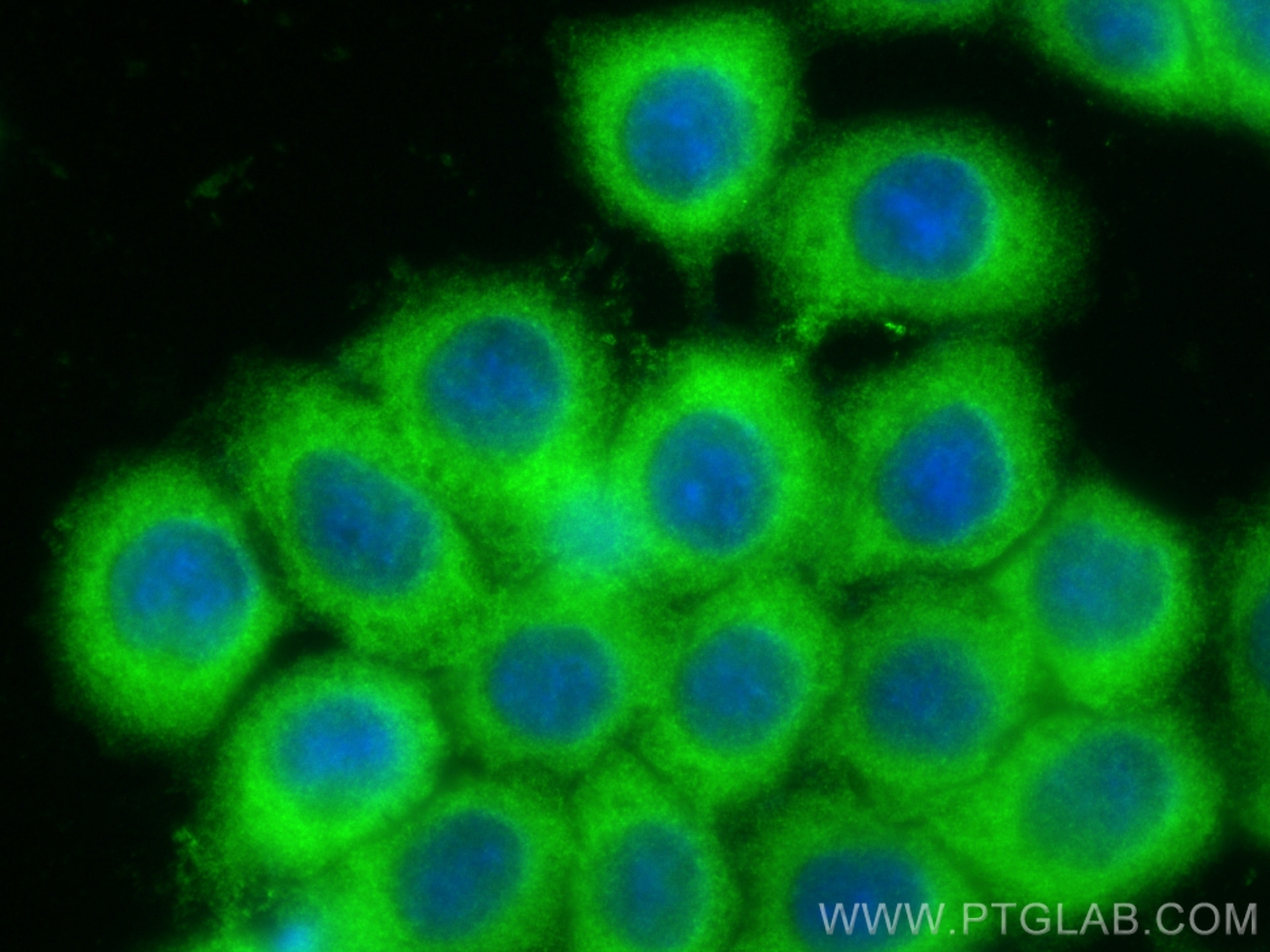Validation Data Gallery
Tested Applications
| Positive WB detected in | Sp2/0 cells, HeLa cells, mouse liver tissue, THP-1 cells, Jurkat cells, C6 cells, NIH/3T3 cells, rat liver tissue, mouse placenta tissue |
| Positive IP detected in | A431 cells |
| Positive IHC detected in | human prostate cancer tissue Note: suggested antigen retrieval with TE buffer pH 9.0; (*) Alternatively, antigen retrieval may be performed with citrate buffer pH 6.0 |
| Positive IF/ICC detected in | BxPC-3 cells |
Recommended dilution
| Application | Dilution |
|---|---|
| Western Blot (WB) | WB : 1:2000-1:10000 |
| Immunoprecipitation (IP) | IP : 0.5-4.0 ug for 1.0-3.0 mg of total protein lysate |
| Immunohistochemistry (IHC) | IHC : 1:20-1:200 |
| Immunofluorescence (IF)/ICC | IF/ICC : 1:50-1:500 |
| It is recommended that this reagent should be titrated in each testing system to obtain optimal results. | |
| Sample-dependent, Check data in validation data gallery. | |
Published Applications
| KD/KO | See 8 publications below |
| WB | See 37 publications below |
| IHC | See 9 publications below |
| IF | See 6 publications below |
| IP | See 2 publications below |
| CoIP | See 2 publications below |
Product Information
11334-1-AP targets PTPN1/PTP1B in WB, IHC, IF/ICC, IP, CoIP, ELISA applications and shows reactivity with human, mouse, rat samples.
| Tested Reactivity | human, mouse, rat |
| Cited Reactivity | human, mouse, rat, monkey |
| Host / Isotype | Rabbit / IgG |
| Class | Polyclonal |
| Type | Antibody |
| Immunogen | PTPN1/PTP1B fusion protein Ag1878 相同性解析による交差性が予測される生物種 |
| Full Name | protein tyrosine phosphatase, non-receptor type 1 |
| Calculated molecular weight | 435 aa, 50 kDa |
| Observed molecular weight | 45-55 kDa |
| GenBank accession number | BC015660 |
| Gene Symbol | PTP1B |
| Gene ID (NCBI) | 5770 |
| RRID | AB_10642566 |
| Conjugate | Unconjugated |
| Form | Liquid |
| Purification Method | Antigen affinity purification |
| UNIPROT ID | P18031 |
| Storage Buffer | PBS with 0.02% sodium azide and 50% glycerol pH 7.3. |
| Storage Conditions | Store at -20°C. Stable for one year after shipment. Aliquoting is unnecessary for -20oC storage. |
Background Information
PTPN1 (protein tyrosine phosphatase, non-receptor type 1) is also named as PTP1B or PTP-1B, and belongs to the protein-tyrosine phosphatase family and non-receptor class 1 subfamily. PTPN1 is involved in the regulation of several important physiological pathways, which regulates both INS and leptin signaling, and interacts with the epidermal-and platelet-derived growth factor receptors (PMID: 20101100). The gene might harbor variants influencing susceptibility to INS resistance and type 2 diabetes (PMID:15919813). The molecular mass of PTPN1 is 50 kDa, but sometimes some truncated forms can be detected as 48, 46, 39, 37 kDa due to non-specific proteolytic cleavage of PTP1B in different cells (PMID: 18253097).
Protocols
| Product Specific Protocols | |
|---|---|
| WB protocol for PTPN1/PTP1B antibody 11334-1-AP | Download protocol |
| IHC protocol for PTPN1/PTP1B antibody 11334-1-AP | Download protocol |
| IF protocol for PTPN1/PTP1B antibody 11334-1-AP | Download protocol |
| IP protocol for PTPN1/PTP1B antibody 11334-1-AP | Download protocol |
| Standard Protocols | |
|---|---|
| Click here to view our Standard Protocols |
Publications
| Species | Application | Title |
|---|---|---|
J Ginseng Res Ginsenoside compound K reduces ischemia/reperfusion-induced neuronal apoptosis by inhibiting PTP1B-mediated IRS1 tyrosine dephosphorylation | ||
Aging (Albany NY) Glycochenodeoxycholic acid induces stemness and chemoresistance via the STAT3 signaling pathway in hepatocellular carcinoma cells. | ||
J Cell Physiol Circular RNA circTET3 mediates migration of rat vascular smooth muscle cells by targeting miR-351-5p. | ||
Front Cell Dev Biol Tubeimoside I Inhibits Cell Proliferation and Induces a Partly Disrupted and Cytoprotective Autophagy Through Rapidly Hyperactivation of MEK1/2-ERK1/2 Cascade via Promoting PTP1B in Melanoma.
| ||
Eur J Pharmacol Oleanolic acid derivative alleviates cardiac fibrosis through inhibiting PTP1B activity and regulating AMPK/TGF-β/Smads pathway |
